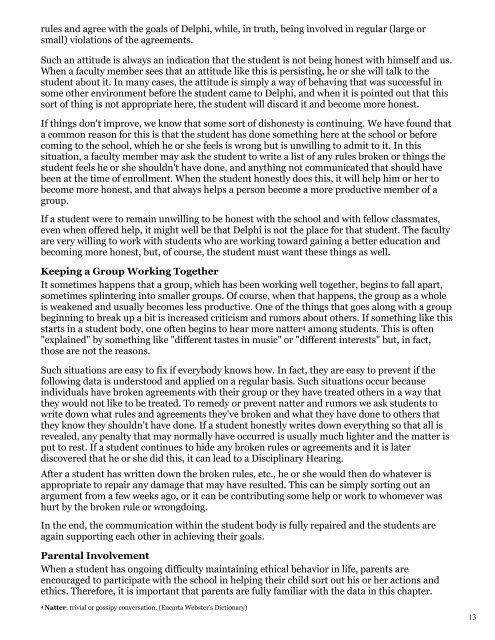Parent Handbook 2018 Digital
Create successful ePaper yourself
Turn your PDF publications into a flip-book with our unique Google optimized e-Paper software.
ules and agree with the goals of Delphi, while, in truth, being involved in regular (large or<br />
small) violations of the agreements.<br />
Such an attitude is always an indication that the student is not being honest with himself and us.<br />
When a faculty member sees that an attitude like this is persisting, he or she will talk to the<br />
student about it. In many cases, the attitude is simply a way of behaving that was successful in<br />
some other environment before the student came to Delphi, and when it is pointed out that this<br />
sort of thing is not appropriate here, the student will discard it and become more honest.<br />
If things don't improve, we know that some sort of dishonesty is continuing. We have found that<br />
a common reason for this is that the student has done something here at the school or before<br />
coming to the school, which he or she feels is wrong but is unwilling to admit to it. In this<br />
situation, a faculty member may ask the student to write a list of any rules broken or things the<br />
student feels he or she shouldn't have done, and anything not communicated that should have<br />
been at the time of enrollment. When the student honestly does this, it will help him or her to<br />
become more honest, and that always helps a person become a more productive member of a<br />
group.<br />
If a student were to remain unwilling to be honest with the school and with fellow classmates,<br />
even when offered help, it might well be that Delphi is not the place for that student. The faculty<br />
are very willing to work with students who are working toward gaining a better education and<br />
becoming more honest, but, of course, the student must want these things as well.<br />
Keeping a Group Working Together<br />
It sometimes happens that a group, which has been working well together, begins to fall apart,<br />
sometimes splintering into smaller groups. Of course, when that happens, the group as a whole<br />
is weakened and usually becomes less productive. One of the things that goes along with a group<br />
beginning to break up a bit is increased criticism and rumors about others. If something like this<br />
starts in a student body, one often begins to hear more natter 4 among students. This is often<br />
"explained" by something like "different tastes in music" or "different interests" but, in fact,<br />
those are not the reasons.<br />
Such situations are easy to fix if everybody knows how. In fact, they are easy to prevent if the<br />
following data is understood and applied on a regular basis. Such situations occur because<br />
individuals have broken agreements with their group or they have treated others in a way that<br />
they would not like to be treated. To remedy or prevent natter and rumors we ask students to<br />
write down what rules and agreements they've broken and what they have done to others that<br />
they know they shouldn't have done. If a student honestly writes down everything so that all is<br />
revealed, any penalty that may normally have occurred is usually much lighter and the matter is<br />
put to rest. If a student continues to hide any broken rules or agreements and it is later<br />
discovered that he or she did this, it can lead to a Disciplinary Hearing.<br />
After a student has written down the broken rules, etc., he or she would then do whatever is<br />
appropriate to repair any damage that may have resulted. This can be simply sorting out an<br />
argument from a few weeks ago, or it can be contributing some help or work to whomever was<br />
hurt by the broken rule or wrongdoing.<br />
In the end, the communication within the student body is fully repaired and the students are<br />
again supporting each other in achieving their goals.<br />
<strong>Parent</strong>al Involvement<br />
When a student has ongoing difficulty maintaining ethical behavior in life, parents are<br />
encouraged to participate with the school in helping their child sort out his or her actions and<br />
ethics. Therefore, it is important that parents are fully familiar with the data in this chapter.<br />
4<br />
Natter: trivial or gossipy conversation. (Encarta Webster's Dictionary)<br />
13


